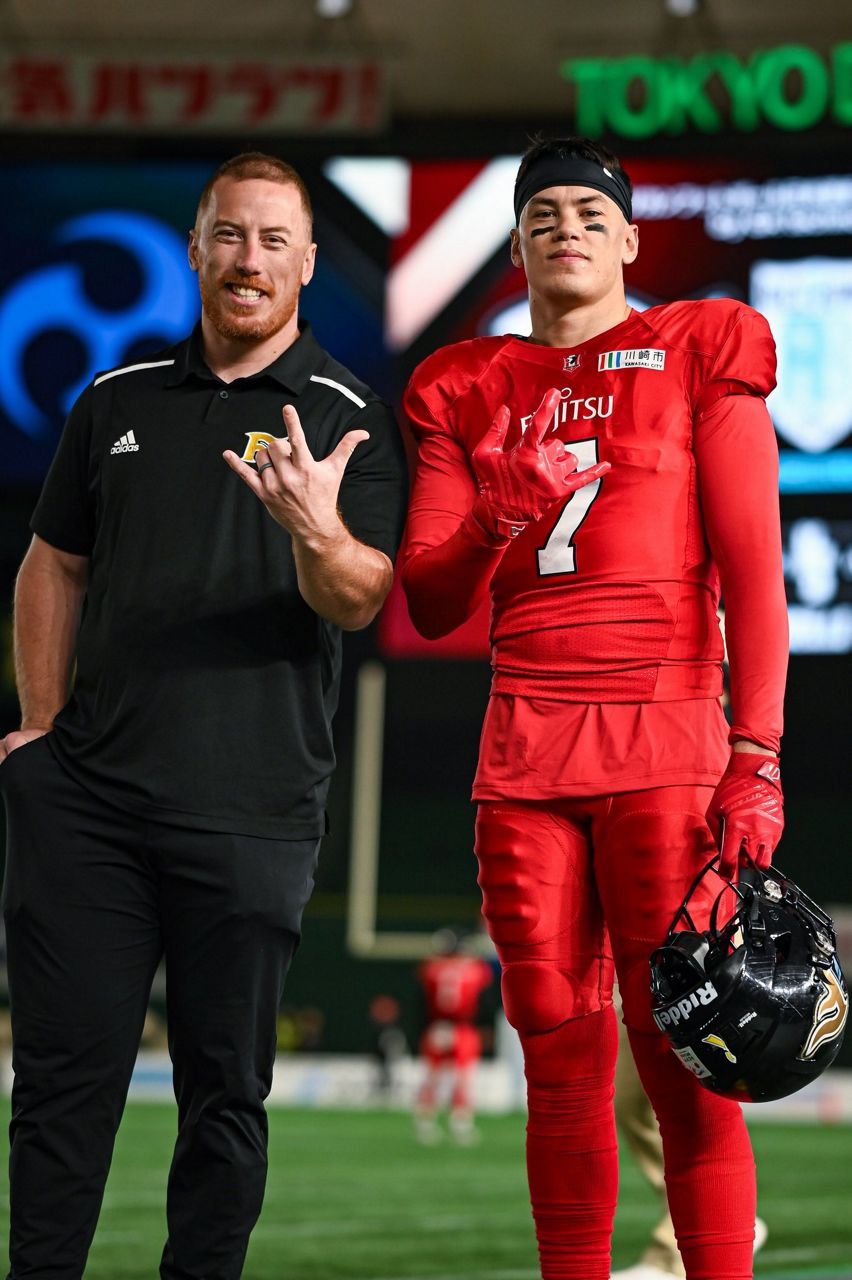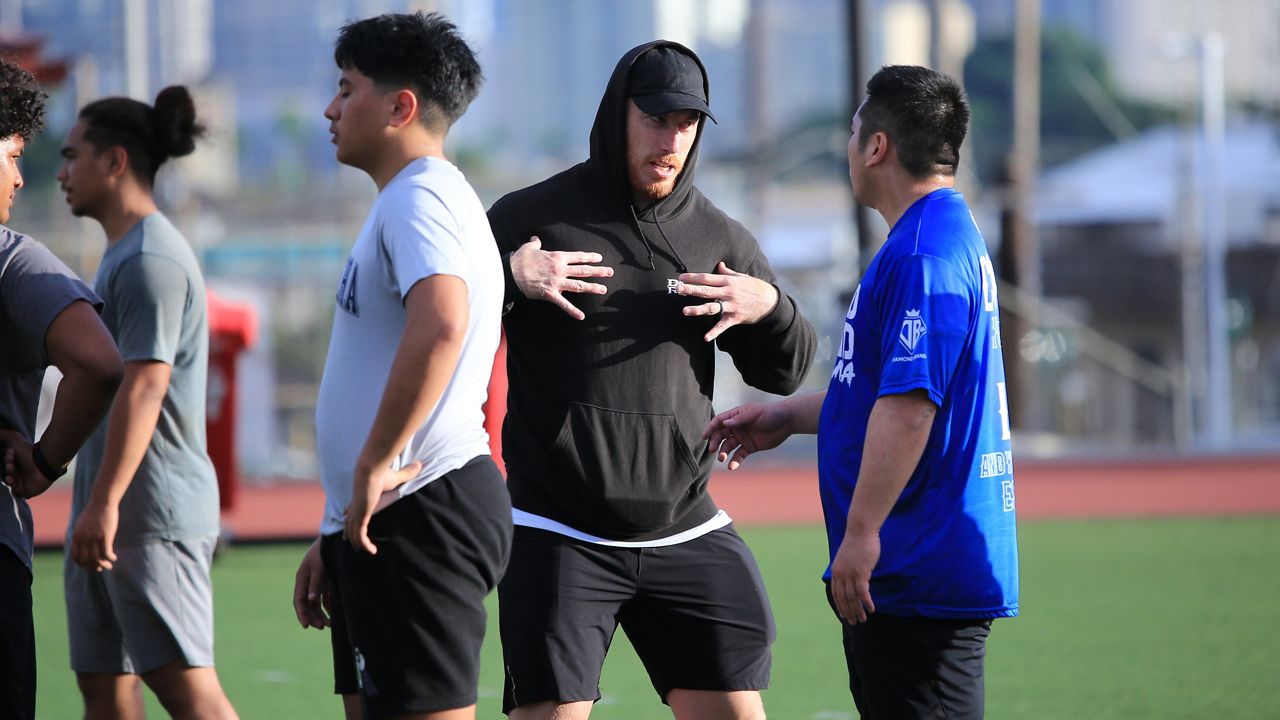BJ Beatty’s welcome-to-the-league moment was lost in translation.
In one of the first games of a 10-year playing career in the X-League, Japan’s semi-professional American gridiron football organization, the former Kahuku High and University of Colorado defensive end did what he did best: He kept coming.
Beatty eluded blockers and collided with the opposing team’s poor running back so hard that the ball-carrier’s cleats hit the back of Beatty’s helmet. The referee threw a penalty on the hit — a brutal but probably legal collision back stateside. Beatty, who was in the country just a matter of weeks playing for the Chiba-based Obic Seagulls in 2012, could not understand. All he knew in Japanese was his number.
Seagulls teammate Kevin Jackson, a former University of Hawaii defensive lineman who was proficient with the language, told him that the ref said his hit was too violent. Beatty was dumbfounded.
“I told (Jackson), ‘Well, I guess they’re gonna have to get used to me because I honestly don’t know how to play any other way,’” Beatty recalled with a chuckle.
Whether Japan got used to Beatty or Beatty got used to Japan is a matter of perspective. He is still there, now a full-time defensive line coach with another of the X-League’s elite teams, the Kanagawa-based Fujitsu Frontiers. His younger brother Bronson is there as a player after playing alongside BJ on the Seagulls for five years.

Fujitsu Frontiers assistant coach BJ Beatty, left, with younger brother Bronson, a player for the Frontiers, after the Rice Bowl at the Tokyo Dome on Jan. 3. (Photo courtesy of BJ Beatty)
He is fluent in Japanese. He married a Japanese woman and they have three children that they raise in the greater Tokyo area, with occasional trips back to Hawaii to visit Beatty’s family on Oahu’s North Shore.
Beatty is one of two X-League coaches from Hawaii currently in the league, but local players have ventured there in numbers since the early 2010s, looking for any opportunity to keep playing ball short of the NFL or CFL. His spot opened up when former UH D-lineman Karl Noa finished up his time in Japan. David Stant, a family friend who went on to become Kamehameha football coach, helped convince him that Japan was a viable option to extend his playing career.
Before that, he didn’t know Japanese gridiron existed.
The X-League comprises a group of companies that sponsor teams. They are allowed to have four foreign players on their roster; these Americans are usually quarterbacks or skill position players.
Or, in Beatty’s case, a pass-rushing defensive end. Through Colorado, where he was a All-Pac-12 honorable mention as a senior outside linebacker, he was known for his wild red hair protruding from the back of his helmet. It would arrive on target a split second after Byron Junior — the son of the former Kahuku defensive coordinator of the same name and a nephew of Chris Naeole — laid the wood on some poor soul.
“It wasn’t the NFL, but the fact that I got to play the game I love (in Japan) — I got paid for it and played for as long as I did,” he said. “If you had asked me that in high school, I would’ve laughed at you. Me? No way.”
The league follows NCAA football rules and mirrors the August-to-January season.
Former UH quarterback Inoke Funaki, a fellow Kahuku alum, can attest to Beatty’s relentlessness. The two met soon after Funaki finished his master’s as a graduate assistant at UH. He went to Japan to be a player-coach in 2013, four years after his college career ended. He got a rude welcome.
“BJ was our waterboy when I was playing in high school,” Funaki recalled. “He had long, long red hair. … I would watch him when I was in college, as an all-state high school player, made his way to Colorado, did well … and then (I got) to play against him.
“He’s rushing to sack me … and he sacked me several times, even strip-sacked me once. (He) picked it up and ran it back for a touchdown. I just think, ‘this guy used to be my little waterboy, and now he’s over here embarrassing me here on the football field out here in Japan.’”
They can laugh about it now. Funaki, now the quarterbacks coach for the defending champion Panasonic Impulse, and Beatty greet each other warmly during season meetings. The most recent was in the Rice Bowl, the X-League’s championship game planned annually at the Tokyo Dome. Panasonic ended Fujitsu’s three-year reign, 34-27, on Jan. 3.
Beatty’s consolation prize was long-term job security. After the season, he was promoted from part-time to full-time Fujitsu assistant coach.
He’d already gone all-in on the game in Japan, doubling up as an assistant with Tokyo University (known in shorthand as Todai) for the Japanese college game. He even formed his own company (DARE, or Determination Attitude Relentless Effort) and taken young Japanese players back to the islands with him for clinics, like in February 2024 at Farrington High, and the cross-cultural experience. But with his promotion, he has set those mostly aside for now.
Beatty was used to standing out from a young age. His bright orange hair, a gift from his maternal grandmother of Irish descent, made blending in difficult.
In Japan, it was like a beacon.
“It was early on when I first (went to) Japan, one of my teammates from his office building on like the 20th story sends me a picture of me walking across the street. I’m literally across the street from his building. He goes, ‘Oh, look, I see you.’”
By that point, it didn’t bother him. He was already cultivating a reputation as a villain in the small but tight-knit Japanese football circles. In practices, he had knocked several teammates out with his hits. Nobody else was playing that hard.
His coaching style mirrors that his time as a player: No half measures. It was an ethos instilled in him at a young age by his father and uncle.
“In the moment, it seemed harsh, but they gave me the tough love that I needed,” Beatty said. “They had high expectations not only of themselves, but me. And they would push me to meet those expectations, if not to go beyond.”
It took him two or three years to get the proper command of Japanese. Now he coaches fully in the language, saving his English for the few times when he needs to rip into somebody.
“To get mad in Japanese doesn’t sound right to me. It sounds too polite,” Beatty said.
Beatty recalled that when Fujitsu approached him for a possible coaching gig a few years ago, the general manager respectfully informed him that he never thought he’d sit down with a player of Beatty’s reputation for rival Obec, a team that had won championships at Fujitsu’s expense.
“He’s like, ‘When you were playing, I mean this in the best way, I hated you,’” Beatty said with a laugh.
To Funaki, that said everything that they were willing to set that aside and bring him in to help.
“He’s a big energy guy. So I think the Japanese coaches love it, because that’s kind of what they [think] when they imagine American football in America,” Funaki said, “those types of coaches that are very loud, yelling a lot, getting guys hyped up and ready and in the mood for practice or for games. And that’s totally BJ’s personality.”
Greater exposure to the American game over the years and perhaps the influence of foreign coaches like Beatty and Funaki have rubbed off over time on the Japanese players, who, with rare exception, hold regular full-time jobs with their companies.
“Now it’s awesome because you see guys, they’ll lay a huge hit, get up, flex their muscles, pound their chest,” Beatty said.
There are signs the game has grown. UH’s starting placekicker, Kansei Matsuzawa, is a native of Tokyo who taught himself how to kick, came to the States and made it to UH out of Hocking Junior College.
Beatty encouraged local players in Hawaii to broaden their horizons.
“Football, if you use it the right way, man, it’s a great tool for your life,” he said. “It can take you beyond (where) you can ever imagine. I’ve been to multiple countries just because it is game. I’ve met people all around the world, you know, all because of a simple game.”
Brian McInnis covers the state’s sports scene for Spectrum News Hawaii. He can be reached at brian.mcinnis@charter.com.
